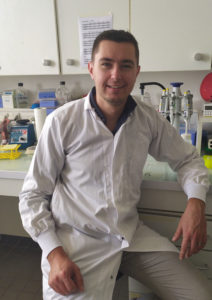Researcher’s portrait – ISITE-BFC fellowships
Olivier Burgy, ISITE-BFC tenure track

Through his university career, Olivier BURGY has specialized in the field of pulmonary fibrosis, focusing on the use of in vivo and in vitro cell and molecular biology approaches. Since 2019, he has been working at Université Bourgogne Franche-Comté as assistant professor and has been attached to the Lipids, Nutrition, Cancer laboratory (UMR1231 / uB, INSERM, EPHE, Agrosup). He is member of the European Respiratory Society and American Thoracic Society and is a reviewer of several scientific journals including, among others, the European Respiratory Journal, Thorax and the American Journal of Respiratory Cell and Molecular Biology.
1. On the third I-SITE call for project, you applied for an international junior fellowship in order to join one of the UBFC research laboratories. Could you please give us the main motives of your application?
I started my career with a solid background (Master and PhD in Cell and Molecular Biology) and an expertise in lung fibrosis acquired at the Research Center Lipids, Nutrition, Cancer (LNC – UMR866 / uB, INSERM, EPHE, Agrosup). At the time of application for the International Junior fellowship, I was a post-doctoral fellow at the University of Colorado in Denver (Colorado, USA), where I studied the role of Extracellular Vesicles (EVs) in pulmonary fibrosis in the lab of Dr Melanie Königshoff. I wanted to expand this novel research axis and develop my own research group in an academic setting. More particularly, the idea was to develop new potential options to manage chronic pulmonary diseases, especially through the study of Heat Shock Proteins (HSPs) linked to EVs. I found at the LNC two mentors, Dr Carmen Garrido and Dr Philippe Bonniaud, both internationally recognized experts respectively in the fields of HSPs and pulmonary fibrosis. In addition, the Research Center LNC offered access to state-of-the-art technical cores, seminal to perform cutting-edge research. Both aspects fulfilled the key requirements to successfully come back to France to develop my career. Taking part into teaching was another motivation of my application to the ISITE-BFC International Junior fellowship. Since I have started, I am involved into teaching and training students to dive into the world of cellular and molecular biology. The approach “from research to education and back” is, to my opinion, the best approach to stimulate and give rise to new ideas and I am delighted to take part in this objective of excellence at UBFC.
2. Could you give us a better insight of your role inside the laboratory you have chosen to join?
My main goal in the laboratory is to develop a new and innovative research axis among the groups of Carmen Garrido and Philippe Bonniaud. I now drive a small group with an engineer and two PhD students in co-direction. In the lab, I also take part in training PhD students and give insights to drive their research projects. I also bring an expertise to develop our basic research topics towards translational projects in the field of chronic lung diseases. In order to achieve this, I also take part into expanding our collaborative network, locally and within UBFC, as well as (inter)nationally. As an example, the lead project I am driving is based on a translational approach involving my postdoc laboratory at the University of Colorado Denver.
3. In your opinion, what would be the main strengths of the I-SITE project run by UBFC?
The ISITE-BFC project and its programs aim to promote excellence within UBFC, both on the research and education sides. The project has many significant strengths to achieve this goal. The International Junior Fellowship, for example, promotes a path to independence, while being still mentored, similarly to the K99 awards from the US National Institute of Health (NIH). The aim this fellowship is to provide early career researchers a solid background to apply to independent funding (such as ERC Starting Grant). The funding inherent to the International Junior Fellowship is also flexible and allows the investigator to hire personal and to invest in equipment. Finally, being awarded by this Fellowship from the UBFC, in line with the Investment for the Future of the French Government, is definitely a plus to gain visibility. I am very motivated and will give all the necessary energy to contribute to the mission of Excellence of the ISITE-BFC project.
